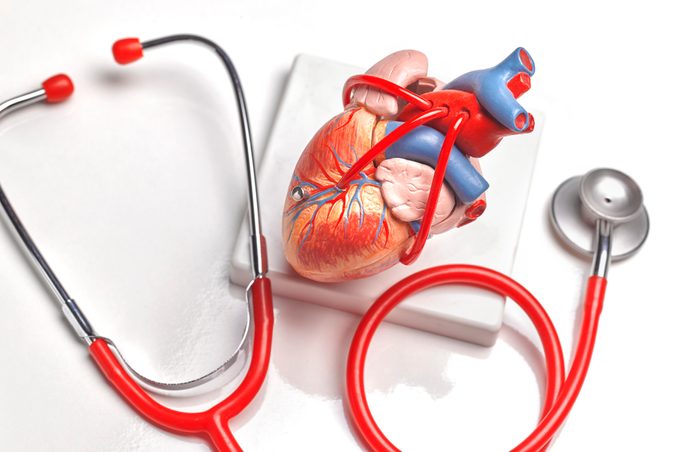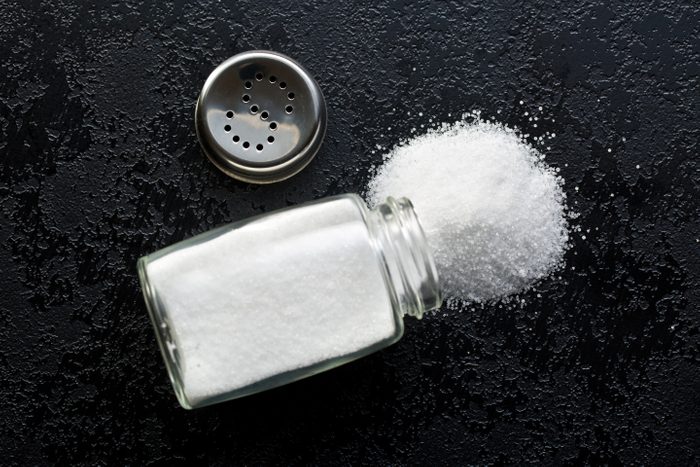What do your heart valves do?
You may think you know a lot about your heart and how to prevent heart disease but you may be missing an important piece of the puzzle. Your ticker is equipped with four heart valves, with the main one being the aortic valve.
“It’s the valve that controls blood flow coming out of your heart into the rest of your body. It’s under the greatest stress,” says Elizabeth Klodas, MD, founder of Preventive Cardiology Consultants in Edina, Minnesota. After all, it’s working overtime for you. “It’s amazing that our valves don’t give out when we’re five. The aortic valve opens and closes like a door 60 times a minute 24/7. It’s a resilient, almost miraculous design that can keep going for 100 years-plus,” she adds.
There are ways to strengthen heart valves naturally, including healthy eating, controlling your blood pressure, exercise, and more. Read on for more tips on keeping your heart valves healthy.

Heart valves naturally wear down over time
With all that opening and closing, they’re bound to see wear and tear eventually. “As people get older, it’s not unusual to see a thickening of the heart valves or a bit of an accumulation of calcium on them on a heart ultrasound,” says Dr. Klodas.
A potentially life-threatening condition is called aortic stenosis, a severe thickening of the aortic valve that begins to interfere with blood flow out of the heart. The heart has to work harder to overcome the blockage, which can cause complications and damage, including heart failure.
“Untreated, this has a worse outcome than metastatic cancer,” says Dr. Klodas. A heart valve replacement is one possible treatment.

Eat foods that are good for your heart
Heart-healthy diet choices take care of your ticker as a whole, including your heart valves. And that means managing your cholesterol. “People who have high cholesterol have more accelerated narrowing of their aortic valve,” says Dr. Klodas, who’s also the co-founder of Step One Foods. She suggests looking at the quality of your diet, especially when it comes to carbohydrates.
“The more processed and farther away the food is from its original form, the more likely you are to have high cholesterol,” she says. Insulin spikes from refined carbs drive LDL cholesterol and triglycerides, she explains. Focus your diet on minimally processed beans, greens, nuts, seeds, fruits, veggies, and grains, and avoid foods that are bad for your heart.

Watch your blood pressure
In the past, a blood pressure reading above 140/90 was considered high blood pressure. In 2017, the American College of Cardiology published new guidelines, lowering the definition of hypertension to 130/80.
“High blood pressure is the second most preventable cause of heart disease,” says Ravi Dave, MD, the director of interventional cardiology at UCLA Health. (Smoking is number one, he adds.) The update now allows “more patients to get diagnosed with high blood pressure early on to prevent problems down the line.”

Stop smoking
You can blame lighting up for one of every three deaths of heart disease, according to the Surgeon General’s Report on Smoking and Health. It accelerates plaque buildup in arteries, leads to clot formation, and can raise blood pressure.
Quitting is not only smart for your heart as a whole, but will also have a positive impact on the working parts inside. The only answer is to quit, says Dr. Klodas. (The good news is that your body heals in many ways when you quit smoking.)

Cut back on salt
If you have high blood pressure or are at an increased risk for heart disease (or even if you are healthy), experts say you should cut back at salt. Aim for no more than 1,500 mg of sodium per day, says Dr. Klodas. That’s roughly half a teaspoon a day, according to the American Heart Association.
It can be difficult to do, but cooking more fresh foods at home will go a long way in reducing your intake. After all, 70 percent of the sodium in the average person’s diet comes from packaged or restaurant food. (For a good start, avoid these foods that are high in sodium.)

See your doctor
You can’t do anything specifically to make sure your heart valves stay healthy, other than make choices to lower your overall cardiovascular risk, says Dr. Dave. Heart valve issues may stem from congenital heart defects—which are problems with your heart’s structure that were present when you are born.
One sign that something is awry? You have a heart murmur. “It’s a red flag for valve disease,” he says, adding that you’d need to visit your doctor on a regular basis to monitor it.

Know your risk
If you have a known valve deformity, there are additional things you need to take precautions for—like dental cleanings. Something as minor as that can dislodge bacteria into your bloodstream, infecting a valve. “Bacteria can stick on them and create more havoc,” says Dr. Dave.
The damage can cause a leaky heart valve, which can be dangerous. You may want to discuss potential preventive options—like antibiotics—with your doctor or dentist. It’s yet another reason to be informed about your health and work closely with your health care provider.

Keep moving
Yes, you always hear enough about how you need to exercise, but it doesn’t mean you need to start running marathons. All you need to do is move a little, a habit that will help you live longer. “What most people want to achieve is healthy longevity. It’s not a cholesterol number. It’s not a healthy valve. It’s being aware, active, and vital into your 90s, and being free of debilitating disease,” says Dr. Klodas.
People who achieve that stay active in their day-to-day lives, she says. It’s not a spinning class or a triathlon, but simple movement doing the things you love, like hiking on the weekends, walking with your dog, or dancing around your living room to music you love.

Stay mindful
Finding short periods during the day to focus on the present moment can go a long way in protecting your heart. People who score the highest in measures of mindfulness had an 83 percent higher prevalence of good heart health compared to those who rank low in it, according to research published in the International Journal of Behavioral Medicine.
Making time for these meditative moments was associated with a lower likelihood of smoking, more physical activity, and a healthier BMI and fasting glucose level, all of which fine-tune your ticker.

